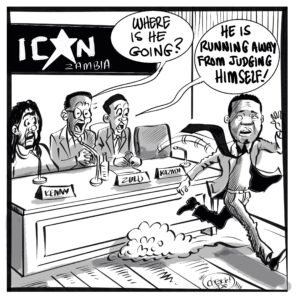RAINBOW Party secretary general Wynter Kabimba says President Edgar Lungu is not the cause of the problems with Zambia’s economy, arguing that removing one person from power cannot automatically improve things.
Speaking when he featured on Radio Phoenix’s Let the People Talk programme, Tuesday, Kabimba said even if President Lungu left office, status quo would continue unless the fundamentals of the economy were attended to.
“I disagree with all of you that go standing on the anthill that the problem with this economy is Edgar Lungu, my answer is no. Even if you removed Edgar tomorrow and I am sure he will not be there forever, if you don’t attend to the fundamentals of this economy, the problems of this economy will continue like they have continued in all other African countries. I know that we all want change but we also have a history which has taught us that not every change has improved this country. We removed [Dr Kenneth] Kaunda in 1991, we were worse off under MMD. We removed MMD in 2011, we are worse of today under PF. So you won’t perturb me with that argument that if you run the crusade that the removal of one person is what is going to bring about problems and fix everything overnight, that’s a ridiculous argument and I don’t buy it,” he said.
And Kabimba said the current crop of African leaders were self-interested and had veered away from the nationalist values of their founding fathers.
“The issue of who should stand up to speak for Africa and I want to give this comparison, the reason why Mozambique, Angola, South Africa, Zimbabwe are independent today it is because we have had a crop of men, nationalists, across Africa, in the name of Ben Bella in Nigeria, Kaunda in Zambia, Julius Nyerere in Tanzania, Sekuture in Guinea, Leopard Sengo in Senegal and many others. Nhuruma in Uganda and many others. They hatched one idea that Africa is one continent, they also agreed that Africa is under exploitation by the West, they also agreed that they are going to protect the natural resources of Africa. So when they went to establish the organisation of African Unity. They set up a charter that was very clear, it is no longer the case now. Now you have African leaders that are balkanised, each one is an individual, you don’t even know what they agree on…So, we have veered away from the spirit of one Africa and this has given advantage to the West to eliminate these leaders one by one,” Kabimba said.
“So now, the crop of all these leaders is gone, we are remaining with a crop of self-interested leaders in Africa. The crop of intellectuals that used to write and sit back and think, Chinua Achebe, France Fanon, and the intellectuals of the 80s is going…now, you have African writers that are writing from America about Africa. What can they write?”
Meanwhile, Kabimba said he supported the cyber security law because it was high time social media was used positively to develop the country.
“What is happening to my country today is that everybody is just on social media and a lot of stuff that I see on social media is either wrong or it is a manifestation of ignorance and that’s why I support the Cyber Security Act. It’s high time that we used social media positively and for the development of the country, I think that’s what we should be doing. I don’t think democracy means that we should just wake up one day and start insulting another person, I think we are misunderstanding the definition of democracy, a government for the people, by the people for the people and whatever,” he said.
Kabimba also said while he was a believer in democratic discourse, private media should be responsible and nationalistic.
“I am a believer in democratic discourse, I am a believer in listening to other views, I am a believer in the philosophy that your view would and could actually give me a better perspective than more than what I think. And therefore, I don’t subscribe to the closure of private media. I think a democracy must be founded on a broader discourse. So the position that I would take actually is that get everybody in check, do the rules and this brings me to this point as I conclude. Private media must be responsible, private media must be nationalistic, private media must be patriotic, civil society organisations must be nationalistic, they must be patriotic to the country,” said Kabimba.
“Invariably, most of our media houses in Zambia are foreign sponsored, most of our civil society organisations are foreign sponsored, that’s the problem that we have. So we have a lot to do to win back our independence as Kaunda and his group conceived it. The problem that I see as I agonise myself is whether or not future generations of this country will be able to claim the nationalism that Kaunda exhibited during that time.”

























One Response
Would it also not be ridiculous if the economy was booming, it is attributed to one person? Changing one person, especially at the top can change a lot of things. The cyber bill is a good idea, but the definition of people given power, without restraint, to enforce it is what is worrisome.